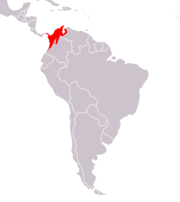Lesser capybara
| Lesser capybara | |
|---|---|
| Scientific classification | |
| Kingdom: | Animalia |
| Phylum: | Chordata |
| Clade: | Synapsida |
| Class: | Mammalia |
| Order: | Rodentia |
| Family: | Caviidae |
| Subfamily: | Hydrochoerinae |
| Genus: | Hydrochoerus |
| Species: | H. isthmius |
| Binomial name | |
| Hydrochoerus isthmius Goldman, 1912 | |
 | |
| Range of the lesser capybara | |
The lesser capybara (Hydrochoerus isthmius)[2] is a large semiaquatic rodent of the family Caviidae found in eastern Panama, northwestern Colombia and western Venezuela.[3] It was recognized as a distinct subspecies of capybara in 1912, and was elevated to species status in 1991. It breeds year-round, with an average litter size of 3.5.[1] Individuals may be diurnal or nocturnal and solitary or social depending on season, habitat and hunting pressure.[1] This species is reported to be common in Panama but rare in Venezuela.[1] It is threatened by subsistence hunting, the destruction of gallery forests and swamp drainage, specifically the swamp drainage of the Magdalena River.[1] Its karyotype has 2n = 64 and FN = 104.[3]
References
- 1 2 3 4 5 Delgado, C.; Emmons, L. (2016). "Hydrochoerus isthmus". IUCN Red List of Threatened Species. IUCN. 2016: e.T136277A22189896. Retrieved 9 September 2016.
- ↑ Hydrochoerus isthmius (lesser capybara). University of Michigan Museum of Zoology, Animal Diversity Web. Retrieved on June 11, 2009.
- 1 2 Woods, C.A.; Kilpatrick, C.W. (2005). "Infraorder Hystricognathi". In Wilson, D.E.; Reeder, D.M. Mammal Species of the World: A Taxonomic and Geographic Reference (3rd ed.). Johns Hopkins University Press. p. 1556. ISBN 978-0-8018-8221-0. OCLC 62265494.
This article is issued from Wikipedia - version of the 11/11/2016. The text is available under the Creative Commons Attribution/Share Alike but additional terms may apply for the media files.
